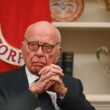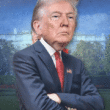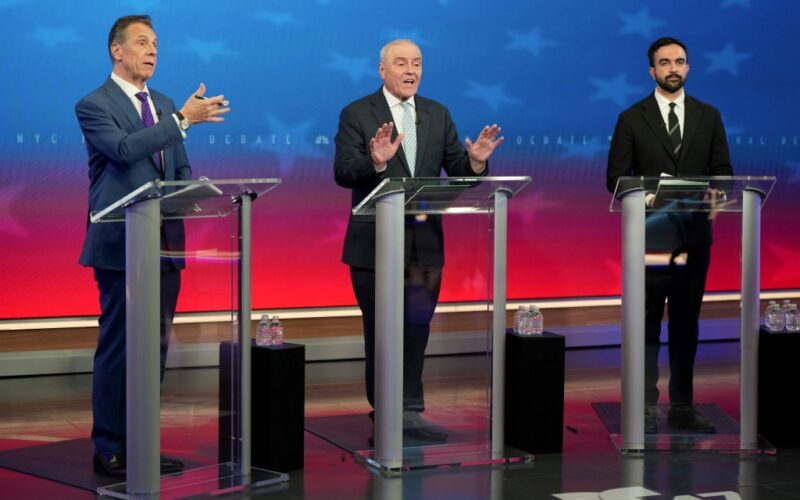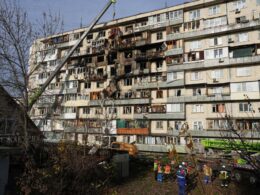“The Jews” are in the news. A full 15 minutes of last week’s first NYC mayoral debate was dedicated to questions about antisemitism and the Gaza conflict — an unprecedented amount of time. This attention is not usually a good thing.
Despite the pundits paying outsized attention to Jewish New Yorkers, the candidates aren’t actually saying much about what they will do to meet their needs. The conversation is more platitude than policy, offering no plan for Jewish safety, inclusion or representation. Voters deserve more leading up to Election Day.
Zohran Mamdani told a Jewish audience that he wants “to be there for [them] when the mezuzah falls.” Mezuzahs don’t “fall” — though they are desecrated in antisemitic hate crimes. “Being there for Jews” means naming who is responsible for antisemitic violence; for verbal and physical abuse; for threats disrupting religious worship; for vandalism at Jewish schools and institutions; for boycotts of Jewish and Israeli businesses — and for the dangerous climate that has enabled this.
An epidemic of anti-Jewish bigotry and violence has been unleashed in New York City. Despite making up only 10% of the population, the NYPD reported in 2024 that Jews were victims of 54% of hate crimes, rising to 62% this year. The majority of this violence is being perpetrated by those acting on an “anti-Zionist” worldview.
At the final debate tonight, voters need clarity on the following questions:
- How do you define and understand contemporary manifestations of antisemitism — in order to fight it?
Andrew Cuomo constantly reiterates his support for “Israel’s right to exist.” But how does he understand and plan to respond to the pain and vulnerability experienced by Jewish and Israeli New Yorkers?
Mamdani declared that he will rescind a mayoral executive order adopting the International Holocaust Remembrance Alliance definition of antisemitism — the most widely accepted, internationally adopted definition. How would a Mamdani administration define, identify and confront antisemitism?
- Which Jewish leaders would you appoint to your transition team, and how will you weigh and consider their advice?
Mamdani declared that he will convene a “team of rivals” in City Hall, but also that people who are “progressive except Palestine” (read: those who support Jewish sovereignty, aka Zionists) are unwelcome in his coalition. Would he create a litmus test for Jewish leaders in his administration?
Curtis Sliwa has derided Orthodox Jews as unlike “normal Americans” and mocked them for “studying Torah and Talmud all day.” He said that, despite having Jewish children, “I also have to hold myself back sometimes” from perpetuating antisemitism. With explosive hate primarily targeting Orthodox Jews, would Sliwa leave them out of his administration?
- How will you ensure safety for Jewish New Yorkers, including by directing your police commissioner to allocate resources to protect them?
Three quarters of Jewish New Yorkers believe antisemitism is a serious threat, and 40% are hiding visible signs of their Jewish identity. Antisemitic incidents are among the hate crimes most likely to involve felonies but least likely to involve arrests. At a time of such heightened Jewish vulnerability, and while the Trump administration has refused to distribute congressionally allocated federal funds under the Nonprofit Security Grants Program, Jews want to know how their Mayor will guarantee their physical safety.
Mamdani has committed to a police presence outside synagogues during the High Holy Days, but how will he protect Jews for the other 350 days a year?
What tools and levers of government will Cuomo utilize to address rising antisemitism, and how will he track the impact of his efforts?
Given Sliwa’s long history of tension with the NYPD, and long-term strategy of outsourcing community safety with vigilantism, how will he overcome apparent mistrust to build a constructive relationship with law enforcement?
- Will you call out antisemitism from your political allies, even when it is politically inconvenient?
There is, unfortunately, no shortage of antisemitism on either side of the political spectrum. While it may manifest differently, we are living in a moment that painfully proves the horseshoe theory: extremists on both the far right and far left converge in their hostility toward Jews. From DSA to MAGA, they echo the same conspiratorial and dehumanizing stereotypes. Leadership means fighting it among your own ranks, not pointing elsewhere as a political strategy. How will each of the candidates fight antisemitism among their own supporters, colleagues and movements?
With just days until early voting opens, the Jewish community deserves serious answers, not slogans, about how our next mayor will confront antisemitism and ensure our full inclusion and safety in the city we call home.
Berman is founder and CEO of Zioness Movement and Zioness Action Fund, which advocate for those who are both progressive and Zionist.








